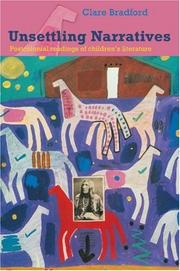| Listing 1 - 2 of 2 |
Sort by
|

ISBN: 1280908009 9786610908004 1554580722 1429480335 9781429480338 9780889205079 0889205078 9781280908002 9781554580729 6610908001 Year: 2007 Publisher: [Waterloo, Ont.] Wilfrid Laurier University Press
Abstract | Keywords | Export | Availability | Bookmark
 Loading...
Loading...Choose an application
- Reference Manager
- EndNote
- RefWorks (Direct export to RefWorks)
Children's books seek to assist children to understand themselves and their world. Unsettling Narratives: Postcolonial Readings of Children's Literature demonstrates how settler-society texts position child readers as citizens of postcolonial nations, how they represent the colonial past to modern readers, what they propose about race relations, and how they conceptualize systems of power and government. Clare Bradford focuses on texts produced since 1980 in Canada, the United States, Australia, and New Zealand and includes picture books, novels, and films by Indigenous and n
Autochtones dans la litterature. --- Litterature de jeunesse --- Postcolonialisme dans la litterature. --- Enfants --- Indigenous peoples in literature. --- Native peoples in literature. --- Children's literature --- Postcolonialism in literature. --- Children --- Canadian native peoples in literature --- Native peoples in drama --- Native peoples in fiction --- Native peoples in poetry --- Aboriginal peoples in literature --- Adivasis in literature --- Books and reading for children --- Reading interests of children --- Juvenile literature --- Literature --- Aspect politique. --- Livres et lecture. --- Histoire et critique. --- Political aspects. --- Books and reading. --- History and criticism.
Book
ISBN: 9781771121774 1771121777 9781771121781 1771121785 9781771121767 1771121769 Year: 2018 Publisher: Waterloo, Ontario, Canada
Abstract | Keywords | Export | Availability | Bookmark
 Loading...
Loading...Choose an application
- Reference Manager
- EndNote
- RefWorks (Direct export to RefWorks)
Part survey of the field of Indigenous literary studies, part cultural history, and part literary polemic, Why Indigenous Literatures Matter asserts the vital significance of literary expression to the political, creative, and intellectual efforts of Indigenous peoples today. In considering the connections between literature and lived experience, this book contemplates four key questions at the heart of Indigenous kinship traditions: How do we learn to be human? How do we become good relatives? How do we become good ancestors? How do we learn to live together? Blending personal narrative and broader historical and cultural analysis with close readings of key creative and critical texts, Justice argues that Indigenous writers engage with these questions in part to challenge settler-colonial policies and practices that have targeted Indigenous connections to land, history, family, and self. More importantly, Indigenous writers imaginatively engage the many ways that communities and individuals have sought to nurture these relationships and project them into the future. This provocative volume challenges readers to critically consider and rethink their assumptions about Indigenous literature, history, and politics while never forgetting the emotional connections of our shared humanity and the power of story to effect personal and social change. Written with a generalist reader firmly in mind, but addressing issues of interest to specialists in the field, this book welcomes new audiences to Indigenous literary studies while offering more seasoned readers a renewed appreciation for these transformative literary traditions.
Canadian literature --- American literature --- Native peoples in literature. --- Indians in literature. --- Indians of Central America in literature --- Indians of Mexico in literature --- Indians of North America in literature --- Indians of South America in literature --- Indians of the West Indies in literature --- Canadian native peoples in literature --- Native peoples in drama --- Native peoples in fiction --- Native peoples in poetry --- Aboriginal peoples in literature --- History and criticism. --- Native authors --- Indian authors --- Aboriginal kinship. --- Gabrielle Roy Prize. --- Indigenous activism. --- NAISA Award. --- PROSE Award. --- badger. --- cherokee authors. --- cherokee writing. --- good ancestors. --- good relations. --- native twitter. --- raccoon. --- resurgence. --- sovereignty. --- thorn and thunder. --- wonderwork.
| Listing 1 - 2 of 2 |
Sort by
|

 Search
Search Feedback
Feedback About UniCat
About UniCat  Help
Help News
News